Iran Guards Arrest Dual Nationals 'Linked To Britain' Over Protests
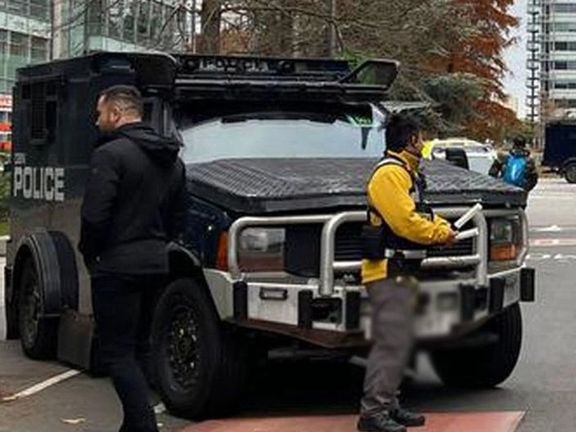
Iran’s Revolutionary Guard arrested seven people Sunday, claiming they had links to Britain, including some dual nationals, over ongoing antigovernment protests.

Iran’s Revolutionary Guard arrested seven people Sunday, claiming they had links to Britain, including some dual nationals, over ongoing antigovernment protests.
"Seven main leaders of the recent protests related to the UK were detained by intelligence services of the IRGC including dual nationals who were trying to leave the country," a statement published by state-controlled media read.
The British foreign ministry said it was seeking further information from Iranian authorities on reports that British-Iranian dual nationals had been arrested in Iran.
Britain’s MI5 said on November 16 that UK authorities had discovered at least 10 “potential threats” since January to “kidnap or even kill British or UK-based individuals perceived as enemies of the regime.” London's Metropolitan Police alerted Iran International at the time of imminent danger to two of its journalists.
The protests, in which demonstrators from all walks of life have called for the fall of Iran's ruling theocracy, has posed one of the biggest challenges to the Shi'ite Muslim-ruled Islamic Republic since the 1979 revolution.
Since the protests began the regime has been blaming foreign “enemies” for organizing and instigating the unrest. It has offered no evidence to substantiate its claims. Earlier, the authorities claimed to have arrested nine foreigners in the protests.
So far, security forces have killed more than 500 civilians, arrested around 18,000 people and hanged two protesters after bogus trials.
The Islamic Republic has a long history of detaining foreign and dual nationals on trumped up charges in what amounts hostage taking, to have bargaining chips against Western countries.
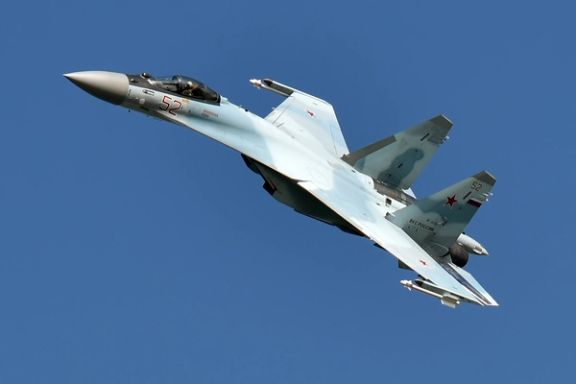
Russia is reportedly preparing to provide the Islamic Republic with Sukhoi Su-35 fighter jets in the near future, Israeli media have reported.
Israel’s Channel 12 quoted some Western intelligence officials on Saturday that as many as 24 jets that were originally intended for Egypt, but thwarted by the US, could be delivered to Tehran.
The Times of Israel says the report also indicated that Iranian pilots have already been trained to use the jets.
Washington has been recently warning that Tehran and Moscow have extensively developed their military relations, as Iran has supplied kamikaze drones that Russia has used against Ukraine.
Both countries are hit by harsh sanctions — the Islamic Republic over its nuclear program and Russia for its war on Ukraine.
A top Ukrainian official called Saturday for the "liquidation" of Iranian factories making drones and missiles, as well as the arrest of their suppliers.
Writing on Twitter on Saturday, Ukrainian presidential aide Mykhailo Podolyak said Iran "blatantly humiliates the institution of international sanctions", before calling for the destruction of Iranian weapon factories in response.
Kyiv has accused Tehran of supplying 1,700 Shahed-136 loitering drones to Moscow. Iran has acknowledged drone deliveries but insists this was not for war in Ukraine.
Western governments have also voiced concern over possible Iranian plans to supply missiles and more weapons to Russia, as the United States and its allies have been sending weapons to Ukraine to turn the tide of the war and not allow Russia to capture more Ukrainian territory.
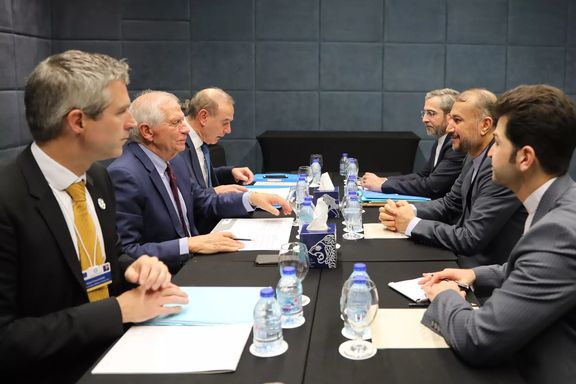
Debates on Iran's unsuccessful foreign policy and the Raisi administration's obvious weakness in this area have come into the spotlight in Iranian media.
The debate began following Foreign Minister Hossein Amir Abdollahian and chief nuclear negotiator Ali Bagheri's reportedly unsuccessful meeting with EU foreign policy chief Josep Borrell in Amman.
Iranian academic Pirouz Mojtahedzadeh said in an interview with Didban Iranwebsite that "Iran's foreign policy is bankrupt." He charged that Iran's diplomats are not well experienced and well trained, adding that Tehran's foreign policy is ideological. He also charged that IRGC generals are the wrong people in the foreign relations arena.
Elsewhere in the interview Mojtahedzadeh argued that the foreign ministry should have a technical rather than ideological approach to foreign policy, adding that Iran needs skilled diplomats who can at least speak English. He said Iranian diplomats should confront their international counterparts, even US diplomats based on the country's national interests rather than any ideology.
Meanwhile, criticizing Tehran's foreign policy priorities which is evident from its attempts to get closer to Moscow and Beijing. He lashed out at China for "its double-standards in the region" and said "Russia will also let us down."

Career diplomats such as Ahmad Azizi have also expressed disappointment over the performance of the foreign minister and his team. Azizi, a former deputy foreign minister, ambassador to Germany and the broker of the deal with the United States over releasing US diplomats who were taken hostage in Iran following the 1979 seizure of the US embassy in Tehran, wrote in a letter to Kamal Kharrazi, the head of Khamenei's Foreign Relations Council that "The foreign minister cannot do anything. Please think of a solution yourself."
Azizi said in the letter that "the chronic and painful crisis of sanctions needs an urgent solution." Meanwhile, he stressed: "The problem is that we have never thought of any problem as a crisis!" He reiterated that solving many of Iran's problems,” including the current economic pressure on the people, “depend on tackling the crisis of sanctions."
According to the letter, published as an op-ed in the reformist daily Etemad, "The routes to decision making in Iran are closed in the Iranian political system which is facing a catalogue of crises. "
As a result of these crises, Iranians' shopping baskets have become increasingly smaller while there is no solution in sight for the problems of industries and entrepreneurship including rising unemployment figures and the government's indecision about the future of the young generation.
The biggest hurdle is opposition by Iran's hardliners to reviving the 2015 nuclear deal based on their ideological, anti-US stance. On Thursday, Hossein Shariatmadari the editor of Khamenei-funded ultraconservative Kayhan newspaper lashed out at Iranian negotiators and diplomats for expressing readiness for a deal with the West during the meeting in Amman.
He wrote: "Why did you say you were ready for negotiations over the JCPOA while Europe and the United States are insisting on their support for Iranian rioters [protesters]?" Other Iranian media including Didban have said that Shariatmadari's opposition to renewed negotiations reveals that a key part of the Iranian government opposes the revival of the talks.
Shariatmadari's connection to Khamenei, once again point fingers at the Supreme Leader as the main obstacle to a deal that could save ordinary Iranians from a long-standing financial misery.
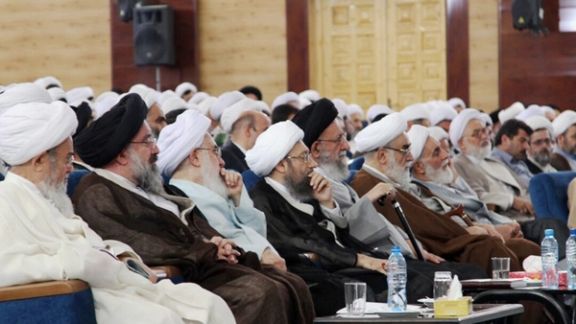
An influential hardliner clerical group in addition to executions demands punishing Iranian protesters by cutting fingers and toes instead of just exiling them.
In a statement Saturday, the Association of Qom Seminary Teachers urged the authorities to continue executions but use the amputation punishment to deter people from joining the protests instead of lenient punishments in the law such as exile.
The association (Jame’e Moddaresin-e Howzeh Elmiye-ye Qom) suggested that anyone who “instigates fear in society” -- supposedly by participation in anti-government protests -- is belligerent (mohareb) which in Iran's Sharia-based laws is punishable by death, crucifixion, severance of limbs, and/or exile.
Ayatollah Abbas Ka’abi, a member of the clerical group, said last week that despite normal practice in the case of murders where victims’ families can practice the “right to blood” – that is demand retribution in kind (death sentence), ‘blood money’, or forgive -- the “imam” of the society should punish a belligerent protester even if the family forgives the killer.
Another member, Ayatollah Mohsen Araki, said Friday that those who participate in the protests, whether this includes direct involvement in the killing of government forces or not, should be considered as belligerents and be found guilty of “corruption on earth.”
The clerics, who are loyal followers of Iran’s ruler Ali Khamenei and are regime insiders benefitting from power and perks, simply twisted a 1,400-year-old vague concept of a crime to fit the regime’s agenda against dissent.
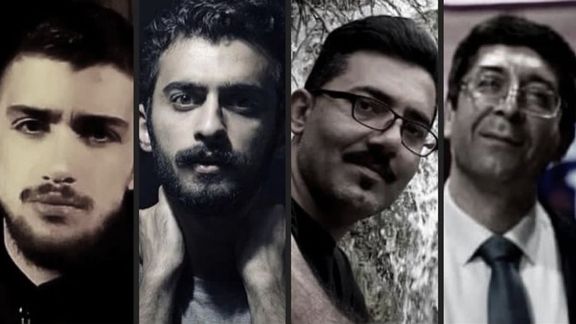
“The severing of fingers of one hand and toes of the opposite foot could be effective [as a deterrent punishment]” if a person “instigates fear in society, without the involvement of the [opposition] media and without urging others to follow suit,” the clerics of the powerful association suggested while arguing that the ‘exile’ option is too lenient to “prevent crime”.
Several Shiite religious scholars this month voiced their opposition to this interpretation of Islamic law, but the harsh approach is what the regime prefers.
They also stated that even if no killing is involved, a protester’s “crime” should be punished by death if they commit it with the “goal of causing fear and a sense of insecurity in the society and knowing that these actions would be publicized domestically and abroad.” Exile would be totally ineffective in such cases, they declared, because such actions tarnish Iran's image in the international community and bear other costs for the government.
The reference to the media and publicizing acts of protest is a reminder of the regime’s extreme sensitivity to media coverage of its repressive acts, particularly by television channels abroad that broadcast in Persian.
The Islamic Republic on December 8 hanged 23-year-old Mohsen Shekari after a secret Revolutionary Court trial. Four days later Majidreza Rahnavard, also 23, was hanged on a street in Mashhad in front of a hand-picked group of insiders to call it a “public hanging”. At least forty protesters are in risk of execution or death penalty sentences by courts in nearly all of which their rights, such as the right to due process, are grossly violated.
Besides intellectuals, politicians and activists in Iran, some high-ranking clerics and former officials such as the prominent scholar Ayatollah Mostafa Mohaqeq-Damad have also condemned protester executions or urged leniency.
A top Sunni cleric, Mowlavi Abdolhamid Esmail-Zehi, who leads the Sunni Friday congregation of Zahedan in the capital of the restive province of Sista-Baluchestan, argued this Friday that the death sentences passed on protesters were not religiously justifiable and warned about the consequences of such harsh punishments. “No ruler has such authority,” he said defiantly.
The international community including various rights organizations and activists, western officials, and politicians have also condemned the recent executions and urged the government to put an end to death sentences. In the past two weeks many European parliamentarians have also offered political sponsorship to detained protesters who are in imminent danger of execution or being sentenced to death.
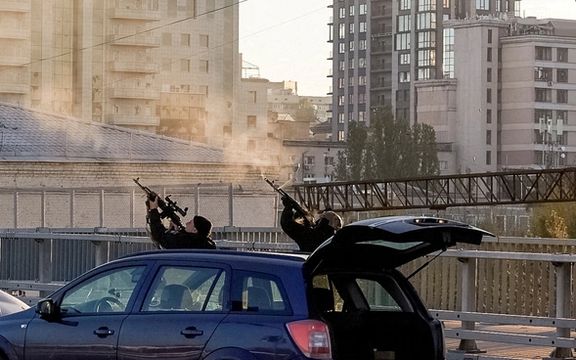
A top Ukrainian official has called for the "liquidation" of Iranian factories making drones and missiles, as well as the arrest of their suppliers.
Writing on Twitter on Saturday, Ukrainian presidential aide Mykhailo Podolyak said Iran "blatantly humiliates the institution of international sanctions", before calling for the destruction of Iranian weapon factories in response.
“Iran, planning to boost missile, drone supplies for Russia, blatantly humiliates the institution of international sanctions… Important to abandon nonworking sanctions, invalid UN resolutions concept, & move to more destructive tools – liquidation of plants, arrest of suppliers…,” he tweeted.
Podolyak’s statement comes days after Ukrainian President Volodymyr Zelenskyy visited Washington to solidify US military and economic support for his country.
It was not clear if the tough statement by the Ukrainian official meant as a suggestion for the US to undertake the destruction of Iranian drone factories, a feat that would mean a military attack on Iran and possibly a regional war in the Middle East. Israel in recent past targeted Iranian nuclear facilities in large-scale and successful sabotage acts,
Kyiv has accused Tehran of supplying 1700 Shahed-136 loitering munitions to Moscow, which it says have been used to hit targets in Ukraine since September. Iran denies the allegations.
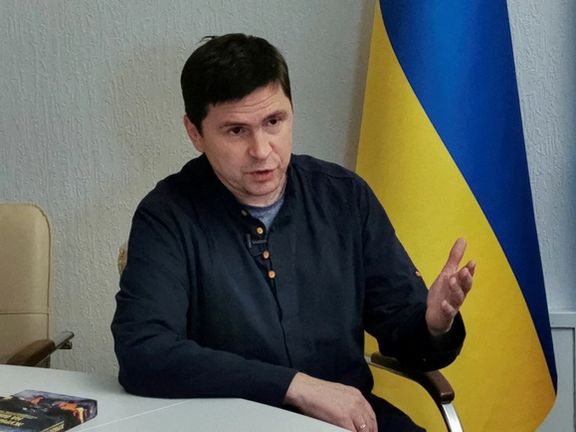
Kyiv has also accused Tehran of planning to supply more weapons to Russia, including missiles that Moscow needs as its stockpiles dwindle after months of relentless attacks against civilian and military targets.
Western governments have also voiced concern over possible Iranian plans to supply missiles and more weapons to Russia, as the United States and its allies have been sending weapons to Ukraine to turn the tide of the war and not allow to capture more Ukrainian territory.
Ukraine's espionage chief said in an interview released on Friday that Russia had already launched around 540 of the drones at military and energy targets in Ukraine.
The United States and its European allies, as well as the European Union have sanctioned various Iranian individuals and entities for supplying drones to Russia. As the United Kingdom imposed sanctions on Iranian entities December 13, foreign secretary James Cleverly said that the UK sanctions were “taking the wheels off the Russian war machine.” A statement issued by the foreign offcie referred to “information” released by the US December 9 - apparently a statement by White House National Security spokesman John Kirby - showing Iran had become “one of Russia’s top military backers.”
Iran has denied supplying weapons to Russia for its war in Ukraine, but foreign minister Hossein Amir-Abdollahian after earlier denials acknowledged in early November that Tehran had supplied drones to Moscow “months before” the Ukraine war, leaving it vague if these were used in the war.
In a second tweet, Podolyak also mentioned North Korea and Belarus as countries aiding Russia’s war effort, saying, “Iran (drones/missiles), North Korea (ammunition/weapons), Belarus (infrastructure/territory/equipment). Factually & legally confirmed allies of RF in the war of aggression, mass murders of civilians & deliberate destruction of Ukrainian cities. There will be joint accountability.”
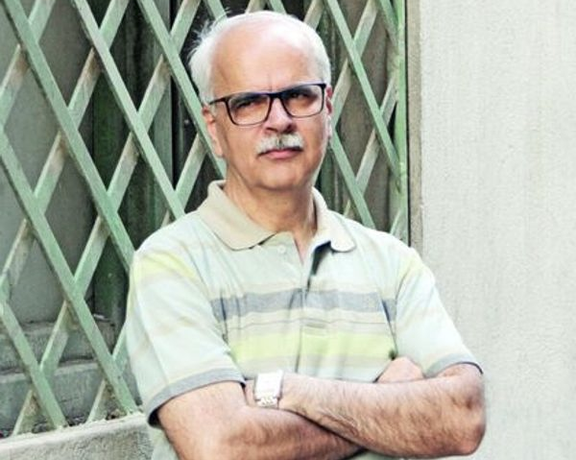
Reports say a revolutionary court in Tehran has sentenced Saeed Madani, a prominent political commentator and researcher, to nine years in prison.
Madani was arrested in May accused of “formation and management of anti-government groups”, “holding gathering and conspiring to commit crimes against the country’s security" and "propaganda against the Islamic Republic of Iran”.
Madani − whose research interests include poverty, drug addiction, child abuse, and prostitution − belongs to the banned Nationalist-Religious Alliance, a small non-violent religious opposition groups that favors political reform and welfare economics.
He has been sentenced and imprisoned several times for membership in the group and for “propaganda against the state.” In 2016, he was exiled to the southern port city of Bandar Abbas after four years of an eight-year prison sentence served at Evin prison, Tehran.
Iran has arrested hundreds of university students, writers and cultural leaders during 100 days of anti-regime protests that began in September.
He has been associated with various opposition groups in Iran, and in response to his criticism of the government’s handling of the COVID pandemic, he was stopped by the IRGC in January this year from traveling from Tehran to take up a post at Yale University.
Madani, 61, a sociology professor at Tehran’s Allameh Tabatabai University, has published several books on social issues in Iran.